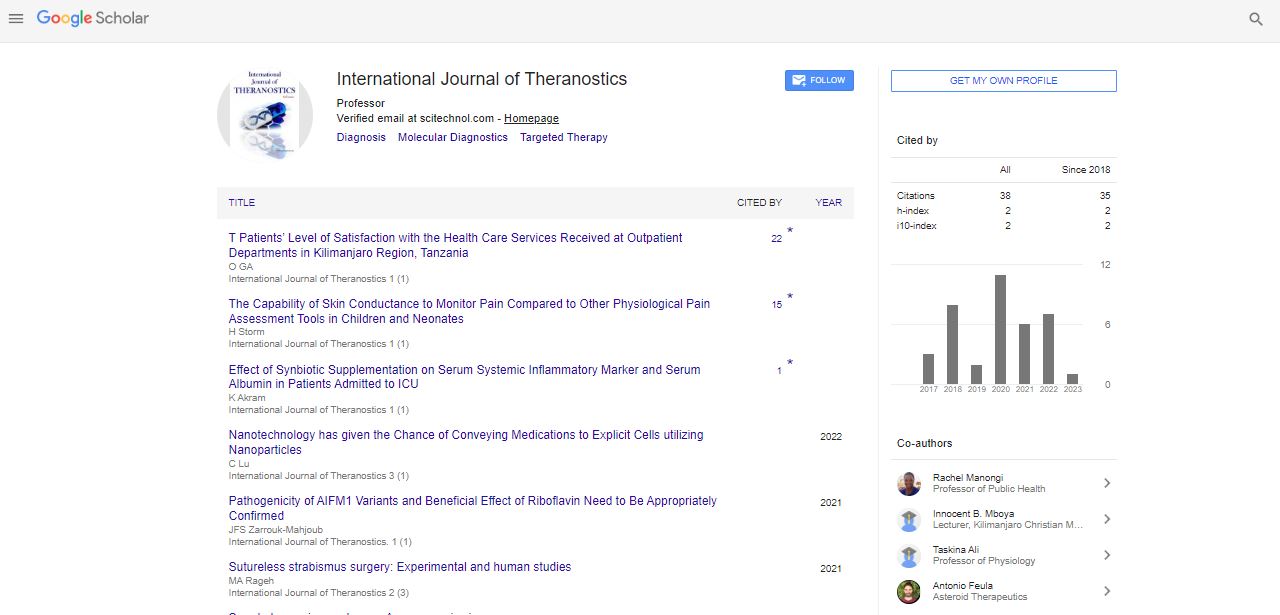Commentary, Int J Theranostic Vol: 12 Issue: 1
Molecular Diagnostics: Revolutionizing Disease Diagnosis and Treatment
Tanvir Ahmed*
1Department of Pharmaceutical Sciences, North South University, Bashundhara, Dhaka, Bangladesh
*Corresponding Author: Tanvir Ahmed
Department of Pharmaceutical Sciences,
North South University, Bashundhara, Dhaka, Bangladesh
E-mail: tanvir.ahmed@northsouth.edu
Received date: 20 February, 2023, Manuscript No. IJT-23-93075;
Editor assigned date: 23 February, 2023, Pre QC No. IJT-23-93075 (PQ);
Reviewed date: 09 March, 2023, QC No. IJT-23-93075;
Revised date: 16 March, 2023, Manuscript No: IJT-23-93075 (R);
Published date: 23 March 2023, DOI: 10.4172/Ijt.1000116.
Citation: Ahmed T (2023) Molecular Diagnostics: Revolutionizing Disease Diagnosis and Treatment. Int J Theranostic 12:1.
Description
Molecular diagnostics is a rapidly growing field in healthcare that uses genetic and molecular techniques to diagnose and monitor diseases. This technology has revolutionized the way we diagnose and treat diseases, providing a faster and more accurate diagnosis than ever before.
Molecular diagnostics is a technique used in medical diagnosis that focuses on analyzing biological markers at the molecular level. This technology detects changes in DNA, RNA, proteins, and other molecules to identify diseases and monitor their progression. Molecular diagnostics includes various techniques such as Polymerase Chain Reaction (PCR), gene sequencing, and two-dimensional gene scanning, that amplify or detect specific genetic sequences, mutations, or other biomarkers. These tests can detect viral infections, genetic disorders, and cancer at an early stage, leading to more effective treatments and improved outcomes. Molecular diagnostics is a rapidly growing field of medicine that has the potential to revolutionize the diagnosis and treatment of various diseases.
Molecular diagnostics is based on the detection of specific nucleic acid sequences in a patient’s sample, such as DNA or RNA. These sequences can be amplified using Polymerase Chain Reaction (PCR) and then analyzed using various techniques, such as sequencing, hybridization, or mass spectrometry. These techniques can detect even small amounts of nucleic acid, allowing for early diagnosis of diseases.
Molecular diagnostics has applications in various medical fields, including infectious diseases, cancer, genetic disorders, and pharmacogenomics. In infectious diseases, molecular diagnostics can detect the presence of pathogens in a patient’s sample, allowing for a faster and more accurate diagnosis. In cancer, molecular diagnostics can identify specific mutations and biomarkers that can help personalize treatment and monitor disease progression. In genetic disorders, molecular diagnostics can identify the causative mutations and help with genetic counselling. In pharmacogenomics, molecular diagnostics can predict a patient’s response to a particular drug, allowing for personalized medicine.
Molecular diagnostics has several advantages over traditional diagnostic methods. It is faster, more accurate, and can detect diseases at an early stage. It can also identify specific mutations and biomarkers, allowing for personalized treatment. Additionally, molecular diagnostics can be performed on a variety of samples, such as blood, urine, or tissue, making it a versatile diagnostic tool.
Despite its many advantages, molecular diagnostics also has some challenges and limitations. One of the challenges is the high cost of the technology, which can limit its accessibility to some patients. Additionally, the interpretation of molecular diagnostic results can be complex, requiring specialized expertise. Finally, molecular diagnostics can also produce false positives or false negatives, leading to misdiagnosis and inappropriate treatment.
Molecular diagnostics is a powerful technology that has revolutionized the way we diagnose and treat diseases. Its applications in various medical fields have led to faster and more accurate diagnosis, personalized treatment, and improved patient outcomes. However, there are still challenges and limitations to overcome, such as cost and interpretation of results. Further research and development in this field will continue to improve the accuracy and accessibility of molecular diagnostics, leading to even better healthcare outcomes.
 Spanish
Spanish  Chinese
Chinese  Russian
Russian  German
German  French
French  Japanese
Japanese  Portuguese
Portuguese  Hindi
Hindi 